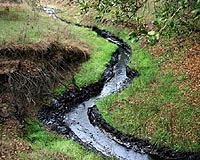| . |  |
. |
New York (AFP) May 29, 2009 A big red dump truck cruises along the Triborough Bridge from the Bronx, spitting thick black smoke in the air. Seconds later, the "green police" turn on their sirens and are in hot pursuit. The polluting driver is pulled over and his face betrays astonishment and disbelief as he sees a young man step out of a dark green SUV emblazoned with the letters "DEC," for Department of Environmental Conservation. The man, who is indeed a police officer, wears a green uniform, a Stetson cowboy hat and a carries a pistol and handcuffs on his belt. "People often think we are park rangers. They ask, 'Where are the deer?'" Timothy Machnica, 24, told AFP. "But when they hear the amount of the ticket, and that they have to appear in court, they stop laughing." A native of the town of Buffalo in northwestern New York state, he has been working in New York City for about a year and a half, in a little known department that has actually existed since 1880 and numbers 300 police statewide. These "green police" are responsible for hunting and fishing regulations throughout the rest of the state, and only about 20 work in New York City. Amid the bright lights and skyscrapers, they track down polluters and just about anything that breaks environmental laws. Typically they record about 300 violations per month, a figure that is rising as Americans become more environmentally aware. Brent Wilson, 26, who is Machnica's colleague, takes a gauge out of his vehicle and places it on the exhaust pipe. Within seconds, he has his verdict: the 1986 vehicle is spewing levels of pollution almost 30 percent higher than allowed by law. He writes a ticket for 700 dollars, with two options: the fine can be reduced if the vehicle is brought into line with current standards within 30 days; if not, the fine rises to 1,300 dollars. The pair leave the disgruntled driver and head south into Chinatown, where a new adventure and one of their regular daily duties awaits: fish market inspection. "We check the size of the fish for protected species, and the origin of shellfish, because there are many regulations, and the US does not accept clams coming from certain waters," explains Machnica. They press deep into the narrow and winding alleys of Chinatown to Mott Street, where Chinese is the predominant language. The duo stop at a small fish stand. Near a bucket filled with live frogs is a rack of clams. "Where is the tag with the origin?" the police ask the fish stand owner, who says he does not speak English and appears furious as he calls someone over to translate for him. He too is given a ticket -- a fine for 500 dollars for failing to label the merchandise properly and is scheduled to appear in court on July 30. Machnica continues on, into a supermarket where Chinese pop music blares and the shelves are stacked with giant green beans and alligator feet. "People become more aware, here in Chinatown they know us," he says, adding that the next day's excursion will be to the Fulton Fish Market in the Bronx. Tomorrow, they will have reinforcements, 15-20 officers in all. But Machnica says it will not be enough. "The recession is hitting us too," he says. "We heard there will be no hirings before 2011, and there are rumors of laying off eight officers." Share This Article With Planet Earth
Related Links Our Polluted World and Cleaning It Up
 Polluted Ecosystems Can Recover
Polluted Ecosystems Can RecoverNew Haven CT (SPX) May 28, 2009 Most polluted or damaged ecosystems worldwide can recover within a lifetime if societies commit to their cleanup or restoration, according to an analysis of 240 independent studies by researchers at the Yale School of Forestry and Environmental Studies. Their findings will appear in the June edition of the journal PLoS ONE. The Yale researchers found that forest ecosystems recovered in 42 ... read more |
|
| The content herein, unless otherwise known to be public domain, are Copyright 1995-2009 - SpaceDaily. AFP and UPI Wire Stories are copyright Agence France-Presse and United Press International. ESA Portal Reports are copyright European Space Agency. All NASA sourced material is public domain. Additional copyrights may apply in whole or part to other bona fide parties. Advertising does not imply endorsement,agreement or approval of any opinions, statements or information provided by SpaceDaily on any Web page published or hosted by SpaceDaily. Privacy Statement |